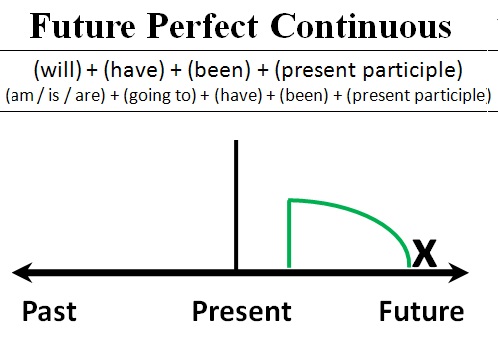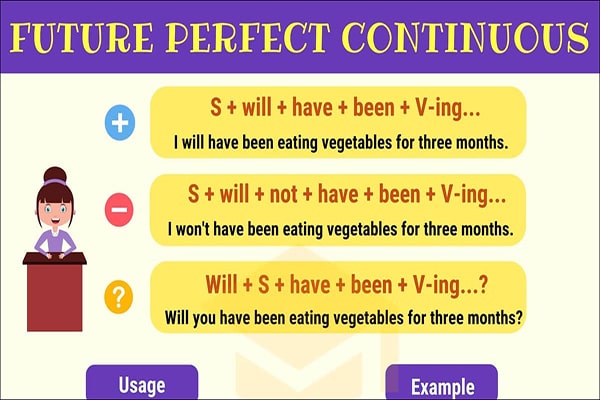Future perfect continuous tense
Join EnglishTopVN to immediately learn important knowledge about FUTURE PERFECT CONTINUOUS tense with Formulas, signs, exercises with detailed answers. Besides, you need to practice the future perfect continuous tense to apply it to all tests.
1. Concepts
The future perfect continuous tense is a tense in modern English. Used to describe an action that has been happening up to a point in the future

2. Formula

In there:
- S (subject): Subject
- Will & have: Auxiliary verb
- Been: II participle of "to be" (verb to be)
- V-ing: Verbs add "ing" ending
2.1. Affirmations
S + will + have + been + V-ing
✎ NOTE:
- "been" always comes last "have".
- Passive sentence form of future perfect continuous tense: Will + have + been + being + V3/ed (For example: Nobody has any clue as to who will have been being elected president during the 2034 term of the presidency. => Nobody has any clue who will be elected president in the 2034 presidential term.)
For example:
- By the end of this year, I will have been playing chess for 2 years.
- At the end of this month, she will have been learning yoga for 2 months.
2.2. Negative sentence
S + will + not + have + been + V-ing
✎ NOTE: We just need to add "not" right after the auxiliary verb "will" and we can write "will not" as "won't".
For example:
- I won't have been playing sports for 3 months until the end of this year.
- I won't have been shopping for 3 months until the end of the year.
2.3. Question sentences
Will + S + have + been + V-ing ?
Reply:
- Yes, S + will
- No, S + won't
✎ NOTE:
Interrogative sentences move the auxiliary verb "will" to the beginning.
Questions using "what, how, when, why,..." have the form: Wh-word + will + S + have + been + V-ing ? (For example: How long will you have been playing chess by the end of the year? => How long will you have played chess by the end of this year?)
For example:
- Will she have been teaching for 5 years by the end of next year?
- Will you have been playing basketball for 2 years by the end of this month? Are you going to have played basketball for 2 years by the end of this month?
3. How to use
3.1. Expresses an action that occurs and continues continuously until a certain time in the future
For example:
I will have been studying English for 10 year by the end of next year.
By August 20th, I will have been working for this company for 20 years.
3.2. Used to emphasize the continuity of an action with another action in the future
For example:
- When I get my degree, I will have been studying at Cambridge for six years.
- They will have been talking with each other for 4 hour by the time I get home.
4. Signs of recognition
– by then: until then
– by this December,…: as of December this year
– by the end of this week/month/year: as of this weekend/this month/this year
– by the time+ 1 clause in the present simple tense
5. Some notes when using
➣ The future perfect continuous tense is not used with clauses that begin with words of time such as: when, while, before, after, by the time, as soon as, if, unless... Instead, you can Can use present perfect continuous tense.
For example:
You won’t get a promotion until you will have been working here as long as Tim (false)
=> You won’t get a promotion until you have been working here as long as Nad. (true)
(You won't get promoted until you've worked as long as Nad.)

